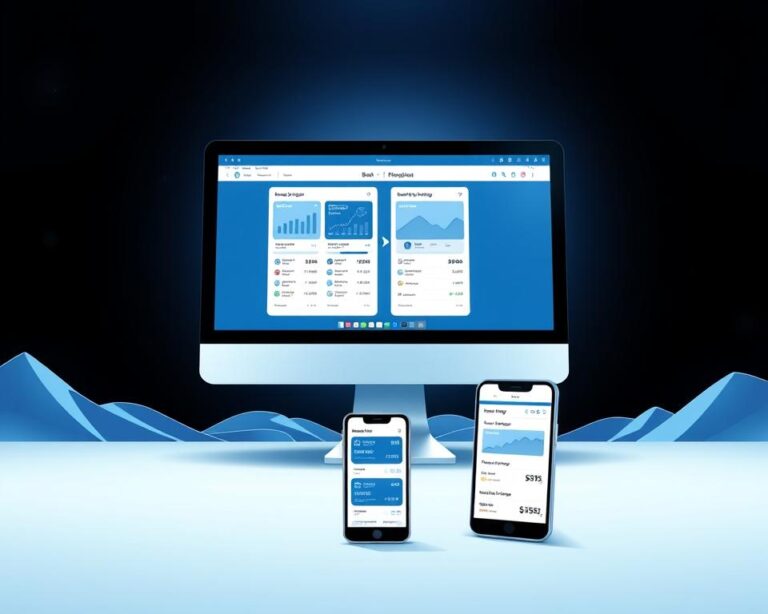Advertisement
Did you know over 30% of startups fail because of bad money management? This shows how vital it is to have a business bank account from the start. A business bank account makes managing money easier and makes your startup look more professional to others.
Without a separate account, mixing personal and business money can lead to trouble during tax time. It can also harm your personal finances. Finding the right banking solutions is key to growing and innovating your startup. We’ll look at the top business accounts for startups and what to think about when picking a bank.
Introduction to Business Bank Accounts for Startups
Starting a business has its own financial needs. This is why introduction to business accounts is important. Business bank accounts are different from personal ones. They help startups manage money better and handle payroll smoothly.
There are many types of business accounts, each with its own perks. They help with tracking expenses and making transactions easier. For startups looking at startup finance options, picking the right account is key for managing money well.
Having a business account is the first step in keeping finances organized. It keeps personal and business money separate. This makes bookkeeping accurate and helps with taxes and reports. Knowing business banking basics is crucial.

Importance of a Dedicated Business Bank Account
Starting a business means getting a dedicated bank account. This is key for keeping personal and business money separate. It helps owners manage their finances better.
Business accounts do more than organize money. They make your company look more professional. This can build trust with customers and partners.
They also help with taxes. Keeping records organized makes tax time easier. It saves time and money.
Finally, business accounts help build credit. Good credit opens doors for loans and investors. These points show why business bank accounts are crucial for success.

Criteria for Choosing the Best Business Bank Account
Choosing a business bank account is a big decision. It’s important to think about several key factors. Good communication with your bank can make a big difference. Here are the main things to consider when picking a bank.
Customer Service and Support
Good customer service is crucial when picking a bank. It helps solve problems quickly. This keeps your banking smooth.
Check how well the bank responds to your questions. This shows if they can help you when you need it.
Fees and Charges
It’s important to know what fees you’ll pay. Look at maintenance fees, transaction fees, and withdrawal limits. This helps you find the best deal for your money.
Types of Services Offered
Look at the services the bank offers. Things like online banking and payment solutions can make your business run better. Make sure the bank has what you need.
| Criteria | Considerations |
|---|---|
| Customer Service | Availability, responsiveness, quality of interactions |
| Fees | Maintenance, transaction charges, withdrawal limits |
| Services Offered | Online banking, payment processing, financial management tools |
Best Business Bank Accounts for Startups
Choosing the right business bank account is key for any startup. Today, there are many banking options designed for new businesses. Here are some top business bank accounts that are great for startups.
American Express Business Checking
American Express offers a business checking account with 24/7 customer support. It also has a competitive APY of 1.3%. This account has no monthly fees, making it a good choice for entrepreneurs.
With its strong reputation and banking solutions, American Express is a top pick for startups.
Axos Bank Business Checking
Axos Bank has a business checking account perfect for modern startups. It offers unlimited domestic ATM fee reimbursements and online banking tools. Axos also has no monthly maintenance fees, making it a top choice for startups.
Bank of America Business Advantage Fundamentals™ Banking
Bank of America’s Business Advantage Fundamentals™ Banking is great for new businesses. It has strong online banking and financial reporting tools. This account is designed to help startups manage their finances well.
Bluevine Business Checking
Bluevine offers a business checking account with high interest rates and no monthly fees. It’s known for easy-to-use banking solutions. Bluevine meets the needs of various startups, making it a top choice.
Comparing Traditional Banks and Online Banks
Choosing between traditional and online banks is crucial for startups. Traditional banks offer in-person service, a wide range of financial services, and personal account managers. This is great for startups that need help and support.
Online banks, however, are becoming more popular. They offer flexibility, lower fees, and higher interest rates. Startups like the ease of digital transactions and the time-saving benefits of fintech solutions.
The table below shows the main differences between traditional and online banks. It helps startups make the right choice:
| Feature | Traditional Banks | Online Banks |
|---|---|---|
| Customer Service | In-person assistance and dedicated account managers | Primarily online support, with chat and email options |
| Fees | Often higher, with potential monthly maintenance fees | Generally lower, with no monthly fees for most accounts |
| Interest Rates | Lower interest rates on savings accounts | Higher interest rates, increasing potential earnings |
| Accessibility | Limited branch locations, but ATM access | 24/7 access through apps and websites, no physical branches |
| Service Variety | Wide range of financial products | Focused on essential banking services, may lack comprehensive offerings |
Knowing the pros and cons of traditional and online banks helps startups choose the best option. Each choice has benefits that match different business needs and goals.
Account Features to Look For
Choosing the right business bank account is key for startups. It’s important to focus on certain features for better financial management. Here are the main things to look at when picking a business bank account.
Low Fees and No Minimum Balance
Fees are a big deal when picking a business bank account. Look for accounts with low or no monthly fees. This helps startups save money, as they often have tight budgets.
Also, accounts without minimum balance requirements are great. They let businesses manage their money without stress. This means no worries about meeting balance requirements.
Interest Rates and Cashback Offers
Interest rates and cashback offers can save you money and give rewards. Good interest rates on deposits can help you earn more over time. Cashback offers can give you money back on your purchases.
This makes banking more useful for businesses. It lets them get value from their daily spending.
Integrated Financial Management Tools
Today’s banking offers tools that make bookkeeping easier. These tools help startups track expenses, send invoices, and manage budgets. They make running a business smoother and more efficient.
Specialized Banking Options for Startups
Startups need financial solutions that fit their unique needs. Specialized banking offers niche solutions that regular banks don’t. Many financial institutions now focus on accounts for emerging businesses, making banking easier.
Grasshopper Bank
Grasshopper Bank is dedicated to startups. It offers high APY rates, up to 1.8%, and cash-back on debit card use. The bank also values community support, making it a great choice for startups.
Brex Business Account
Brex offers banking just for startups. It has a credit card with no personal guarantee, helping businesses keep cash flow. Plus, Brex works with financial tools, making operations smoother.
Mercury Business Bank Account
Mercury is for tech startups, with easy online setup and no monthly fees. It has accounts for different sectors, offering flexibility and efficient banking. Mercury also connects with accounting software, helping growing companies manage finances better.
Understanding FDIC Insurance and Its Importance
FDIC insurance is key for startups looking for financial safety. It protects deposits in banks that are part of the FDIC. This means your money is safe, even if the bank fails. You can have up to $250,000 insured per account type at an FDIC bank.
Banks with FDIC insurance are a big deal for businesses. They let entrepreneurs grow without worrying about bank stability. For startups, knowing your money is safe is a huge relief.
For new businesses, FDIC insurance is a big help. It’s important to pick banks with this insurance for your business accounts. It’s a basic step in managing your finances well.
Conclusion
Choosing the right bank account is key for a startup’s success. It’s important to look at customer service, fees, and services offered. The right bank can help manage finances and grow your business.
It’s crucial to find a bank that fits your startup’s needs. You might prefer a traditional bank or an online bank. Knowing your options is essential.
The right bank account can boost your startup’s financial health. By carefully choosing, you set your business up for success in a changing market.



